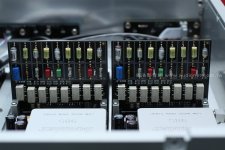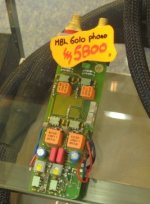Depends on the position in the circuit; for some parts, I use bipolar electrolytics, others I use polypropylene. Mass produced high quality name brands like Wima, Panasonic, CDE, Vishay, that sort of thing.
Of course, that's changing now with the advent of high quality digital crossovers- the speakers I'm working on now have no passive crossover at all.
Of course, that's changing now with the advent of high quality digital crossovers- the speakers I'm working on now have no passive crossover at all.
I second what sy has said but I don't use any electrolytic capacitors in the passive crossover. I use polypro film capacitors and if the price was right I would use film and foil type. I stay away from Mylar, polyester capacitors though they are probably fine in bypass positions. I am as Sy now working with active crossovers, though I haven't jumped to digital implementation. But one thing that I will continue to use are conjugate network on the speaker terminals to correct the impedance curve of the devices. The conjugate crossover differs from a typical Zobel network which is an RC network, as the conjugate network is an RCL network.
Chiming in:
I use good commercial grade components, the ones that are made by the tens or hundreds of millions and have become "market leaders".
I trust 1000 times more a capacitor made by, say, Vishay, Epcos, or a similar *huge* producer on the most modern Factories on Earth, than anything made in a backroom by somebody cutting metal foil with tin snippers and handwinding it.
Couldn't care less that said foil is pure silver or gold, that paper is made of the finest silk that silkworms can produce and that oil came out Moby Dick.
As an example: this is a silver foil capacitor handmade at the famous Audio Note Lab in Tokyo, Japan .
They claim it took them 3 weeks to make it (don't believe me, just read the note):
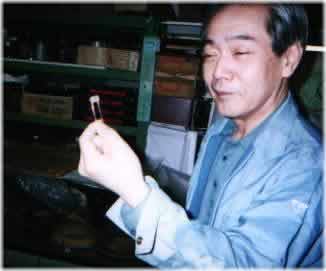
Here they are handmaking silver resistors:
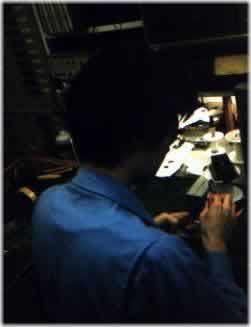
This is the machinery they have available:
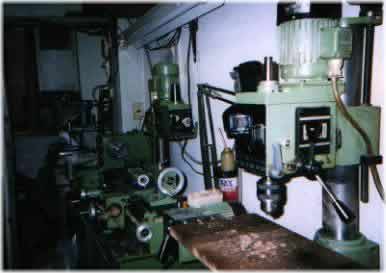
Now, let's compare that to capacitors made in ... India!!!
Surely the machines are pushed by Elephants while Turban clad , barefoot workers use wooden machines to make the capacitors, while singing "Hare Krishna" !!!
Sorry to burst a bubble, *this* is a (one of many) capacitor rolling machine used by (boring, available anywhere) EPCOS in their plant in Bawal, India:
(be sure to click the image so it zooms to full size, so you can see everything in detail):
Sorry for having such a boring taste when choosing parts
PD: please read the original pages where I took these pictures from:
Audio Note Factory Tour [English]
http://http://www.epcos.com/web/gen...es/EPCOS__Bawal__opening__Page,locale=en.html
I use good commercial grade components, the ones that are made by the tens or hundreds of millions and have become "market leaders".
I trust 1000 times more a capacitor made by, say, Vishay, Epcos, or a similar *huge* producer on the most modern Factories on Earth, than anything made in a backroom by somebody cutting metal foil with tin snippers and handwinding it.
Couldn't care less that said foil is pure silver or gold, that paper is made of the finest silk that silkworms can produce and that oil came out Moby Dick.
As an example: this is a silver foil capacitor handmade at the famous Audio Note Lab in Tokyo, Japan .
They claim it took them 3 weeks to make it (don't believe me, just read the note):

Here they are handmaking silver resistors:

This is the machinery they have available:

Now, let's compare that to capacitors made in ... India!!!
Surely the machines are pushed by Elephants while Turban clad , barefoot workers use wooden machines to make the capacitors, while singing "Hare Krishna" !!!
Sorry to burst a bubble, *this* is a (one of many) capacitor rolling machine used by (boring, available anywhere) EPCOS in their plant in Bawal, India:
(be sure to click the image so it zooms to full size, so you can see everything in detail):
An externally hosted image should be here but it was not working when we last tested it.
Sorry for having such a boring taste when choosing parts
PD: please read the original pages where I took these pictures from:
Audio Note Factory Tour [English]
http://http://www.epcos.com/web/gen...es/EPCOS__Bawal__opening__Page,locale=en.html
JM,
apparently for some, Hand-Made has more appeal than High-Tech.
Couple of months ago, I got me a chef's knife, made by hand in Japan.
Work of art, and something that can not be manufactured on an automated production line, yet.
Trouble with Boutique parts is that they have led to such a complex situation.
Manufacturers as Bower & Wilkins feel obliged to use Mundorf parts in their products.
On the other hand, in the electronic XO of their $100K sea-shell, B&W uses budget grade opamps.
What High-Anxiety customers fail to see is that e.g. a guy as Jacques Mahul has been paying attention to XO parts when he wasn't even graduated, and is doing mighty fine with his own-label caps/coils/resistors.
And then there's the entry level, with every characteristic of stamp collecting. (but without actual knowledge)
apparently for some, Hand-Made has more appeal than High-Tech.
Couple of months ago, I got me a chef's knife, made by hand in Japan.
Work of art, and something that can not be manufactured on an automated production line, yet.
Trouble with Boutique parts is that they have led to such a complex situation.
Manufacturers as Bower & Wilkins feel obliged to use Mundorf parts in their products.
On the other hand, in the electronic XO of their $100K sea-shell, B&W uses budget grade opamps.
What High-Anxiety customers fail to see is that e.g. a guy as Jacques Mahul has been paying attention to XO parts when he wasn't even graduated, and is doing mighty fine with his own-label caps/coils/resistors.
And then there's the entry level, with every characteristic of stamp collecting. (but without actual knowledge)
Can you name an example of that in this thread ?
Cause I went through it again a couple of times, and I can't seem to find it anywhere.
I'm not going give examples, as that would be counter productive to my intentions: having an open discussions where ideas and experience are exchanged in stead of opinions. To learn from each other in stead of making marks in that sand. The latter might only make the poster of such remarks feel better, but it will also reject people. What's the point of writing on a forum if one is not interested in other peoples writing? I'll let the posters themselves value their own postings. They ought to be wise enough.
I also reread the postings in this thread and I'll change "a lot of ridiculing" in "some ridiculing"
Can you please define (non-)believer ?
As I consider myself a firm believer in High Grade parts, both in type and brand.
I notice a divide between believers and non believers. For lack of any other better word I use the word believers. But it's also based on the lack of a proper explanation, the thing I'm after (in all honesty). Neither from manufacturers (vendors?) nor from the users. The claims seem to be based mostly on hearsay and dogma.
Difficulty is that a couple of decades ago, non-believers (engineers) were convinced that mylar was good enough, in any position.
Some still do, even in this club.
When the "Nons" did alter their opinion, it led to "stack"-piling of polypropylene caps, and a new trend : Bypassing Unlimited.
Even today, some of the non-believers in exotic foil caps think they are on track with all Ins-and-Outs, and go for High Grade industrial.
Example : Boulder 1008 phono stage, retails for $12K in the US, for you it's €14K.
Boulder proudly claims they're using the best NOS polystyrene caps.
HooHa, with four selectable equalization curves, and a programmed chip to make the relays lock into firing position.
Eeeh, but why do I only see junk PS caps ?
(it's not like the thing runs valves, by which it requires equalization caps with a rating of several hundreds of volts, right ?)
Hint, only ones that come close are the Big & Bad & Blue ones, Philly production.
Easy for me to say, I've been eyeballing PS caps for 3 decades, and got about 15.000 of the finest polystyrene caps ever manufactured.
Industrial ones, by Siemens, ITT and others, for high frequency stuff, and SOTA.
Added a piccy of the real thing for phono.
(and let's not talk $32K- €42.5K of Boulder 2008)
Today's idiot-sans-savant can be tomorrow's chief-design-engineer.
(what's in a word, both have 3, so no big a difference)
Some still do, even in this club.
When the "Nons" did alter their opinion, it led to "stack"-piling of polypropylene caps, and a new trend : Bypassing Unlimited.
Even today, some of the non-believers in exotic foil caps think they are on track with all Ins-and-Outs, and go for High Grade industrial.
Example : Boulder 1008 phono stage, retails for $12K in the US, for you it's €14K.
Boulder proudly claims they're using the best NOS polystyrene caps.
HooHa, with four selectable equalization curves, and a programmed chip to make the relays lock into firing position.
Eeeh, but why do I only see junk PS caps ?
(it's not like the thing runs valves, by which it requires equalization caps with a rating of several hundreds of volts, right ?)
Hint, only ones that come close are the Big & Bad & Blue ones, Philly production.
Easy for me to say, I've been eyeballing PS caps for 3 decades, and got about 15.000 of the finest polystyrene caps ever manufactured.
Industrial ones, by Siemens, ITT and others, for high frequency stuff, and SOTA.
Added a piccy of the real thing for phono.
(and let's not talk $32K- €42.5K of Boulder 2008)
Today's idiot-sans-savant can be tomorrow's chief-design-engineer.
(what's in a word, both have 3, so no big a difference)
Attachments
Last edited:
I find capacitors finished in wood give the best tone.
http://www.dhtrob.com/keesolaf/elco_en.php
|| DHTRob - Tubeamplifiers and fullrange units: Rebuilding a capacitor (1) ||
Studio Zèy
http://www.dhtrob.com/keesolaf/elco_en.php
|| DHTRob - Tubeamplifiers and fullrange units: Rebuilding a capacitor (1) ||
Studio Zèy
These days, most engineers are aware that Mylar (polyester) is a slightly non-linear dielectric so has to be used with care. On the other hand, some 'believers' seem to prefer its mild distortion (while vehemently denying this).jacco vermeulen said:Difficulty is that a couple of decades ago, non-believers (engineers) were convinced that mylar was good enough, in any position.
Some still do, even in this club.
Woodworking is a funny thing. While the tools available to make beautiful furniture have improved and progressed in amazing ways, the quality of the highest quality furniture has diminished in most respects to what was done hundreds of years ago with inferior tools, but experienced tool wielders. The scientific community is crucial to progress and has done so much to explain and improve our lives, but i never ceased to be amaxed at hoe blind they can be about the future and how forgetful they can be about the past. In most cases, you would think a scientist would be of a most humble nature, grasping better than most the scope of the world we live in, but all too often you find the exact opposite. An arrogant mentalist who thinks he has the world defined, and fully explained. I by no means incenuate this about anyone here, but it seems to be a common theme that I ave seen over my short life. Funny thing is, the ones that really make big ripples are the ones who tend to step out of the box and into the unknown. I believe it was Albert Einstein that said an imagination is more important than knowledge.
Albert Einstein Quotes - BrainyQuote
Of course, I am sure there are some here who think he was an idiot.
Albert Einstein Quotes - BrainyQuote
Of course, I am sure there are some here who think he was an idiot.
Jocko Homo did measurements on a Black Gate cap and posted graphs/figures a couple of years ago. Same-Old Same-Old.
AFAIK he said this about BG after extensive testing:
"Still, damn good caps. Just not "magical".
I would love to know how taking a perfectly good capacitor and doing that to it improves things...I find capacitors finished in wood give the best tone.
Agian I love the reference to vilins and luthers, music repreduction is about fidelity, it is NOT creating a musical instrument, but about engineering ones prefered view of fidelity of repreduction.
And the relevance to musical repreduction is...Woodworking is a funny thing. While the tools available to make beautiful furniture have improved and progressed in amazing ways, the quality of the highest quality furniture has diminished in most respects to what was done hundreds of years ago with inferior tools, but experienced tool wielders. The scientific community is crucial to progress and has done so much to explain and improve our lives, but i never ceased to be amaxed at hoe blind they can be about the future and how forgetful they can be about the past. In most cases, you would think a scientist would be of a most humble nature, grasping better than most the scope of the world we live in, but all too often you find the exact opposite. An arrogant mentalist who thinks he has the world defined, and fully explained. I by no means incenuate this about anyone here, but it seems to be a common theme that I ave seen over my short life. Funny thing is, the ones that really make big ripples are the ones who tend to step out of the box and into the unknown. I believe it was Albert Einstein that said an imagination is more important than knowledge.
It's easy to confuse science and engineering. I don't think Einstein paid much attention to mentalists, spiritualists, and other folks who didn't come to the table with actual evidence. 
Good rule of thumb is that if a discovery is made that challenges the first principles view of how the world works, it's unlikely to come from a guy making hifi gadgets in his garage.
Good rule of thumb is that if a discovery is made that challenges the first principles view of how the world works, it's unlikely to come from a guy making hifi gadgets in his garage.
I would love to know how taking a perfectly good capacitor and doing that to it improves things...
Agian I love the reference to vilins and luthers, music repreduction is about fidelity, it is NOT creating a musical instrument, but about engineering ones prefered view of fidelity of repreduction.
And the relevance to musical repreduction is...
How is your box? I assume all your components are op amp based.
Sorry to quote a post from a few pages back. But need to add something.I have to say that I am more ready to believe the claims of someone who has made actual comparisons than someone who posts claims with no concrete evidence or examples.
In this thread alone, but also in many others, the following "points" have been, and are always, made:
Marketers of upscale (boutique, snake oil, call them what you will) caps are offering relabeled standard (or even inferior) quality/construction/materials caps and charging more for them. Naive builders and others claim the relabeled caps are somehow superior to the identical standard brands. The same claim has been made numerous times, but no evidence or examples are ever provided.
People who use crappy drivers or bad speaker designs expect using expensive caps will make them superior to better drivers or better designs. A better cap is never used to improve an already excellent design using the best drivers. No examples were provided.
Web sites that offer evaluations of cap performance make their own parts and sell them, or have some other motive for grading some caps superior to others. Notice that the more expensive caps always receive a higher rating? What else could that possibly tell you other than that the evaluator is somehow in cahoots with cap manufacturers? Aren't they all crooks? No examples were provided, just general slander.
Decent caps can typically vary by 20% from stated value, and people who use them are stupid enough to not be aware that filter parameters will be affected by such large differences in value. No examples were provided, and I honestly believe that no one (certainly not 99%) who builds or modifies crossovers would buy caps with that awful tolerance without knowing how to use them.
I think you guys are making stuff up. Other than self-assured superiority and smug insults, what do you have to offer? Can you provide any concrete evidence or specific examples? Or do we just have to believe you because you KNOW better and the rest of us, the ones who listen carefully and compare, are just biased, delusional fools?
In that case, I will take the word of anyone who dares to risk your ridicule by taking the time and expense to make actual investigations and share the results rather than posting legends and insulting arguments.
Regards,
Tom E
The problem with your post is you've moved the burden of proof. I don't believe it is the job of the one spending the money (or not) to prove the claims of the one selling something. I believe it is the buyer's job to be sceptical, suspicious even. If capacitors manufacturers and retailers don't prove their claims, it is reasonable to assume the worst.
ones prefered view of fidelity of repreduction.
Not sure how the latter follows from the former.How is your box? I assume all your components are op amp based.
Meaning what, or is this a reference to the fact my system (or systems I have more than one) do not have true audiophile credentials, thus mitigating anything I say as objective rubbish. Funny I had the same thing on another thread just recently, it was humorously pointed out that without 15" drivers I would not be able to hear the phenomena being discussed, based on a picture of my speakers and amplification.How is your box? I assume all your components are op amp based.
Music repreduction is not art, or luthering, it is using engineering practices, physics etc to try and create the flawed repreduction that we find most satisfactory to our ears, be it valve, solid state, class d, or in my case op-amp based as you have pointed out.
Would trapanning my haed and sticking a cork (Natural) in it improve my perception.
- Status
- This old topic is closed. If you want to reopen this topic, contact a moderator using the "Report Post" button.
- Home
- Design & Build
- Parts
- when to use high grade caps
